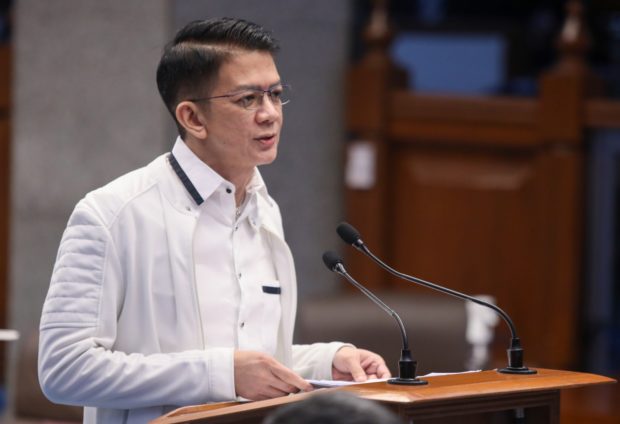
Sen. Francis “Chiz” G. Escudero—SENATE PRIB
Sen. Francis “Chiz” Escudero on Thursday said the new tax measures sought by the Marcos administration would face rough sailing in the Senate, as giving Filipinos such additional burden at this time “is like asking an Eskimo to buy a freezer.”
It also would not help the administration’s cause, Chiz Escudero said, if “the same crew that did a poor job in explaining the Maharlika Investment Fund” would be tasked to push the proposed revenue-generating measures.
In his second State of the Nation Address (Sona) on July 24, President Marcos sought congressional support for several bills, including those on “essential tax measures” under the Medium-Term Fiscal Framework.
These include excise on single-use plastics and value-added tax (VAT) on digital services, rationalization of the mining fiscal regime, motor vehicle user’s charge or road user’s tax, and reforms in the pension system for the military and other uniformed personnel (MUP).
Also on junk food
Last month, the health and finance departments also jointly pushed for the revival of the plan to tax junk food and increase the imposts on sweetened drinks to address health issues especially among Filipino children while generating additional revenues.
Chiz Escudero said the Senate would definitely block new taxes if they would cause further misery to the already “overtaxed” Filipinos.
“One, we have become an e-commerce republic. So, expect a massive pushback when you start taxing any goods added on the cart,” said the senator, referring to a Palace-backed bill that will tax online purchases.
As for the plan to raise motor vehicle registration fees, he said, it would also face roadblocks “as car owners are already taxed twice daily at the pump when gas has a VAT on top of the excise tax.”
“Then there’s the toll, the price motorists pay for government’s failure to fix public roads,” Escudero added.
Good messaging
The senator warned that in pushing new tax measures at this time of “high prices and low wages,” the Marcos administration would be “putting its huge political capital on the line.”
He suggested that the administration come up with some good messaging to convince the people, one where the necessity of having new tax measures is clearly articulated.
“They should be sending out good salesmen (for this) hard-to-swallow product and explain clearly,” Sen. Chiz Escudero said.
But despite having these reservations, he said he would listen to the administration’s proposals in the Senate because “every idea must be given its day.”
Stressed in Sona
In his second Sona, Mr. Marcos said “Higher revenue collections will be critical in our bid to bolster public investments.”
According to the Medium-Term Fiscal Framework, government revenues are expected to improve from P3.73 trillion in 2023 to P6.62 trillion in 2028, with additional money coming in through the proposed tax measures.
If passed, these will be the first major taxes to be imposed under the second Marcos presidency.
Other enacted tax laws
During the Duterte administration, several tax laws were enacted.
Among them was Republic Act No. 11590, signed in September 2021, which mandated payment of gaming tax equivalent to 5 percent of Philippine offshore gaming operator (Pogo) licensees’ gross-gaming revenues, or 5 percent of the agreed, predetermined minimum monthly revenues from gaming revenues, whichever is higher.
One of the two laws that increased “sin” tax rates was Republic Act No. 11467, signed in January 2020. It jacked up the excise on e-cigarettes and alcohol products to help finance the universal health-care law. The other was Republic Act No. 11346, or 2019 tobacco tax law, which increased the excise on cigarettes.
Republic Act No. 10963, or the Tax Reform for Acceleration and Inclusion (Train) law, which came into effect in 2018, increased the excise on gasoline, diesel and kerosene by various rates in three tranches from 2018 to 2020.
—With a report from Inquirer Research
RELATED STORY:
House committee approves bill hiking road users’ tax